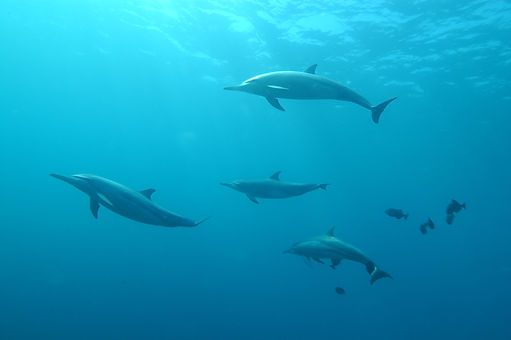

Cetaceans
Whales, dolphins and porpoises - conservation, research, education, protection
Fundación Cethus
Argentina
Fundación Cethus was created in 1992 by a group of researchers and specialists focused on diverse disciplines with the aim of researching, spreading information about and conserving the dolphins and whales of the Argentine Sea. Fundación Cethus chose to focus specifically on cetaceans because of the high level these cetaceans occupy in the sea food pyramid in the marine environment, similar to that we humans occupy in our environment. Website under construction (start 2022)
Fundación Vida Silvestre Argentina
Argentina
Founded in 1977 and since 1988 Vida Silvestre represents in Argentina the World Wildlife Fund (WWF), the Argentine Wildlife Foundation)has been working on solving the main environmental issues of Argentina. Its mission is "to propose and implement solutions for conserving nature, promoting the sustainable use of natural resources and responsible behaviour on the part of mankind in the context of climate change'. This includes a significant marine component, including establishing marine protected areas and a sustainable fishing model for the country, and protecting marine species including cetaceans.
Gesellschaft zur Rettung der Delphine
Germany
GRD was founded by Rollo Gebhard, German mariner and documentary filmmaker, and is dedicated to the conservation of wild dolphins and their habitats by supporting research, promoting public awareness and lobbying for better protection. The organization works for a ban of ecologically unacceptable fishing practices, such as driftnets, which cause the senseless death of hundreds of thousands of dolphins, whales, seals, sharks, and seabirds every year, or setting purse-seine nets around dolphin schools to catch tuna.
Green Heritage Fund Suriname Dolphin Project
Suriname
The Green Heritage Fund Suriname works for the protection of the wild dolphin population through establishment and maintenance of a sound community monitoring program that contributes to decision-making regarding the estuary of the Suriname River. Working on the conservation of dolphins in the estuary inspired GHFS to expand its conservation efforts to include the marine environment in its entirety. This shift in focus inspired the organization to work towards sustainable use and management of the marine environment, which ultimately motivated the GHFS initiate or promote the use of marine spatial planning in Suriname. Addressing marine litter is also an important focus of the organization.
HappyWhale
USA
HappyWhale offers the opportunity to contribute to science through photography of marine mammals. Through its web platform, happywhale.com, images are shared, and individual whales identified, and contributors are notified of who their whale is, as well as of future resightings of their whale. HappyWhale has identified almost every individual humpback whale in the North Pacific Ocean, and has built a global database of over 68000 individuals. This information helps with whale rescue response to entanglement, understanding population change, and education about the world’s whales. An evolving project.
Hebridean Whale and Dolphin Trust
Scotland
The Hebridean Whale and Dolphin Trust works directly with local communities to ensure whales, dolphins and porpoises are protected and valued throughout Scotland’s west coast. Their programme of community based research and education encourages strong local stewardship and supports meaningful change for the conservation of Hebridean cetaceans and marine life.
Hong Kong Dolphin Conservation Society
Hong Kong
HKDCS is the only conservation society dedicated to whales, dolphins and porpoises (cetaceans) of Hong Kong. Their work focuses around the Indo-Pacific humpback dolphin (known as Chinese white dolphin and pink dolphin) and Indo-Pacific finless porpoise. The numbers of these species are dropping rapidly, especially the humpback dolphins, from 250 in the 1990's, to 100 in 2009 to 32 in 2018. HKDCS promotes public awareness, preservation of habitats, raising standards of Hong Kong's whale watching activities and conducts research. They are involved in opposing reclamation projects such as for the airport third runway, bridges and large-scale artificial islands which destroy the habitat of dolphins and porpoises.
Icelandic Orca Project
Iceland
The Icelandic Orcas research project aims to learn more about Icelandic killer whales and their role in the marine ecosystem. This is a long-term dedicated effort to follow killer whales in Icelandic waters and understand more about their behaviour and the threats they may face. 'To achieve this we use a variety of research techniques, such as acoustic recordings, photo-id, tagging with suction-cup tags, biopsy sampling and underwater observations of their interactions with prey.'(from the website)
Instituto Via Delphi
Mexico
The Via Delphi Institute for Research on Marine Mammals works on generating scientific knowledge about marine mammals, mostly of the Tursiops truncatus species. The research center is located in the state of Quintana Roo, near Cancun, where the scientific members make indoor studies; at the same time, the Institute conducts research programs with wild dolphin populations from the Campeche and Tabasco costs, in the Gulf of Mexico, and in Holbox Island, located in the Mexican Caribbean sea. The Institute is divided in two working groups, one composed of biologists and the other of veterinarians, both supported by thesis students and volunteers
Instituto de Conservación de Ballenas
Argentina
The Instituto de Conservación de Ballenas was set up in 1996 with the aim of protecting whales and their environment through research and education. With its headquarters in Buenos Aires, ICB is the Argentinian representative of the Whale Conservation Institute / Ocean Alliance.
International Marine Mammal Project
USA
Since 1982, the International Marine Mammal Project (IMMP) has been a global leader in protecting whales and dolphins and their ocean habitats. IMMP pioneered the Dolphin Safe tuna fishing standard, stopping the intentional chasing and netting of dolphins by many tuna companies and preventing tens of thousands of dolphin deaths annually. They continue to monitor more than 800 tuna companies to ensure they are following Dolphin Safe fishing practices that protect dolphins and other marine life. The organization campaigns to stop all trade in live dolphins and whales, to end the capture and captivity of whales and dolphins for circus performances; and to fight pollution and plastics in the ocean, particularly the entanglement of marine life in fishing gear. IMMP is an Earth Institute project.